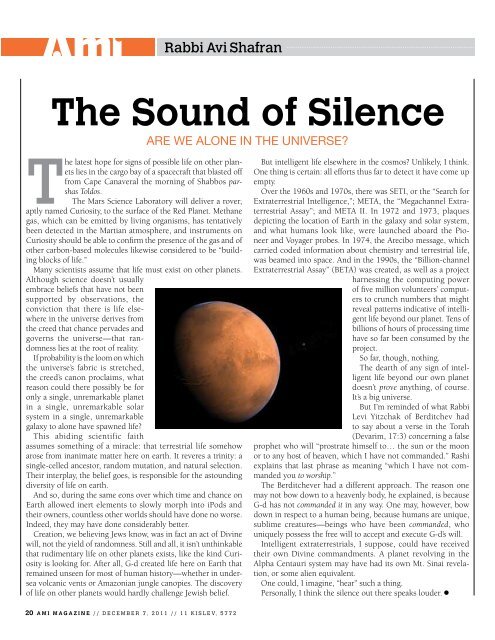4 - Jewish E-Books
4 - Jewish E-Books
4 - Jewish E-Books
Create successful ePaper yourself
Turn your PDF publications into a flip-book with our unique Google optimized e-Paper software.
Rabbi Avi Shafran<br />
The Sound of Silence<br />
ARE WE ALONE IN THE UNIVERSE?<br />
The latest hope for signs of possible life on other planets<br />
lies in the cargo bay of a spacecraft that blasted off<br />
from Cape Canaveral the morning of Shabbos parshas<br />
Toldos.<br />
The Mars Science Laboratory will deliver a rover,<br />
aptly named Curiosity, to the surface of the Red Planet. Methane<br />
gas, which can be emitted by living organisms, has tentatively<br />
been detected in the Martian atmosphere, and instruments on<br />
<br />
other carbon-based molecules likewise considered to be “building<br />
blocks of life.”<br />
Many scientists assume that life must exist on other planets.<br />
Although science doesn’t usually<br />
embrace beliefs that have not been<br />
supported by observations, the<br />
conviction that there is life elsewhere<br />
in the universe derives from<br />
the creed that chance pervades and<br />
governs the universe—that randomness<br />
lies at the root of reality.<br />
If probability is the loom on which<br />
the universe’s fabric is stretched,<br />
the creed’s canon proclaims, what<br />
reason could there possibly be for<br />
only a single, unremarkable planet<br />
in a single, unremarkable solar<br />
system in a single, unremarkable<br />
galaxy to alone have spawned life?<br />
This abiding scientific faith<br />
assumes something of a miracle: that terrestrial life somehow<br />
arose from inanimate matter here on earth. It reveres a trinity: a<br />
single-celled ancestor, random mutation, and natural selection.<br />
Their interplay, the belief goes, is responsible for the astounding<br />
diversity of life on earth.<br />
And so, during the same eons over which time and chance on<br />
Earth allowed inert elements to slowly morph into iPods and<br />
their owners, countless other worlds should have done no worse.<br />
Indeed, they may have done considerably better.<br />
Creation, we believing Jews know, was in fact an act of Divine<br />
will, not the yield of randomness. Still and all, it isn’t unthinkable<br />
that rudimentary life on other planets exists, like the kind Curiosity<br />
is looking for. After all, G-d created life here on Earth that<br />
remained unseen for most of human history—whether in undersea<br />
volcanic vents or Amazonian jungle canopies. The discovery<br />
of life on other planets would hardly challenge <strong>Jewish</strong> belief.<br />
But intelligent life elsewhere in the cosmos? Unlikely, I think.<br />
One thing is certain: all efforts thus far to detect it have come up<br />
empty.<br />
Over the 1960s and 1970s, there was SETI, or the “Search for<br />
Extraterrestrial Intelligence,”; META, the “Megachannel Extraterrestrial<br />
Assay”; and META II. In 1972 and 1973, plaques<br />
depicting the location of Earth in the galaxy and solar system,<br />
and what humans look like, were launched aboard the Pioneer<br />
and Voyager probes. In 1974, the Arecibo message, which<br />
carried coded information about chemistry and terrestrial life,<br />
was beamed into space. And in the 1990s, the “Billion-channel<br />
Extraterrestrial Assay” (BETA) was created, as well as a project<br />
harnessing the computing power<br />
ers<br />
to crunch numbers that might<br />
reveal patterns indicative of intelligent<br />
life beyond our planet. Tens of<br />
billions of hours of processing time<br />
have so far been consumed by the<br />
project.<br />
So far, though, nothing.<br />
The dearth of any sign of intelligent<br />
life beyond our own planet<br />
doesn’t prove anything, of course.<br />
It’s a big universe.<br />
But I’m reminded of what Rabbi<br />
Levi Yitzchak of Berditchev had<br />
to say about a verse in the Torah<br />
(Devarim, 17:3) concerning a false<br />
prophet who will “prostrate himself to… the sun or the moon<br />
or to any host of heaven, which I have not commanded.” Rashi<br />
explains that last phrase as meaning “which I have not commanded<br />
you to worship.”<br />
The Berditchever had a different approach. The reason one<br />
may not bow down to a heavenly body, he explained, is because<br />
G-d has not commanded it in any way. One may, however, bow<br />
down in respect to a human being, because humans are unique,<br />
sublime creatures—beings who have been commanded, who<br />
uniquely possess the free will to accept and execute G-d’s will.<br />
Intelligent extraterrestrials, I suppose, could have received<br />
their own Divine commandments. A planet revolving in the<br />
Alpha Centauri system may have had its own Mt. Sinai revelation,<br />
or some alien equivalent.<br />
One could, I imagine, “hear” such a thing.<br />
Personally, I think the silence out there speaks louder. <br />
20 AMI MAGAZINE // DECEMBER 7, 2011 // 11 KISLEV, 5772









